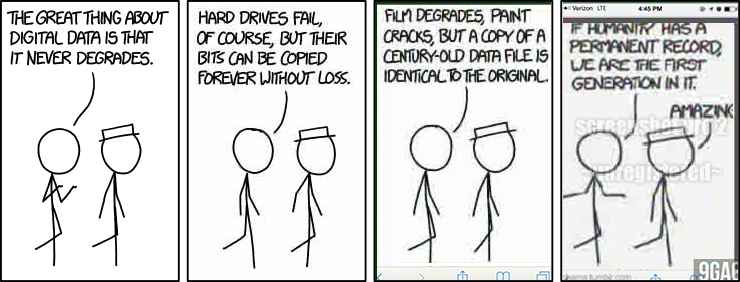
by John Porter & An Nguyen (with input from the LTER IM Committee)
Data is not just important to information managers, but to researchers as well. Long-term ecological data have significantly contributed to ecological and evolutionary scientific disciplines. Here are some reasons to share your data:
- ENABLE NEW SCIENCE – Without data, science is just philosophy. Many questions require data beyond the capabilities of any single individual to collect them, so sharing data in archives advances the science as a whole by helping provide the needed data resources (1,2,3,4).
- TRUST – Surveys have shown that public trust in scientific research is enhanced when the supporting data is made available (5,6).
- MEET REQUIREMENTS – Journals are increasingly requiring submission of supporting data with journal publications. Similarly funding agencies are increasingly requiring evidence of data sharing in prior-support sections (7,8).
- DOCUMENT AUTHORSHIP & GET CREDIT – Putting data in an archive clarifies who should receive credit in the form of citation or co-authorship when others use the data. Prior publication of data in an archive can help protect a data author from having their data misattributed. Moreover, because dates of contributions are logged, priority based on date and time can be documented. Researchers who share data via an archive are more likely to be cited or asked to be co-authors on publications using the data (9,10,11,12).
- REUSE YOUR DATA – It is common for researchers to return to old datasets they, themselves, collected in the past in order to apply them to new questions. However, if the data are not properly archived, with suitable metadata, it can quickly become unreadable (due to data file format changes, computer glitches) or uninterpretable –even by the researcher who originally collected the data. Shared data can also be discovered and used by other researchers who might not have been aware of the original study.
- SAVE TIME – The most frequent users of data are the subsequent graduate students and/or collaborators of the provider. If the data are not archived, the original researcher must repeatedly locate the data on their computer (or worse yet, request it from former students) and explain the format and content to each subsequent person. By archiving the data, while the details are still fresh, the researcher saves time. They can just refer new users to the archive.
- ENABLE CONTINUITY – There are many occasions when data contributors will leave institutions, projects, or retire. When this happens, valuable expertise and knowledge about data might be lost if not transferred properly, negatively affecting research. If data is documented and archived, ideally on an ongoing basis and well before any personnel turnover, continuity of the research program can be more easily ensured.
- PRESERVE DATA – Data in an archive have extra consistency checks and have versions tracked. Without such steps data corruption (computer errors and inadvertent edits) can go undetected. Moreover, it is easy to base analyses on different versions of a dataset without being aware of it. Development of formal versions and quality indicators, such as checksums, avoid these problems (13).
Supporting Information:
- Hampton, S.E., Strasser, C.A., Tewksbury, J.J., Gram, W.K., Budden, A.E., Batcheller, A.L., Duke, C.S., Porter, J.H., 2013. Big data and the future of ecology. Frontiers in Ecology and the Environment 11, 156-162.
- Magnuson, J.J., 1990. Long-term ecological research and the invisible present. BioScience 40, 495-501.
- Anonymous, 2009. Data’s shameful neglect. Nature 461, 145.
- Nelson, B., 2009. Data sharing: Empty archives. Nature 461, 160-163.]
- https://www.pewresearch.org/science/2019/08/02/trust-and-mistrust-in-americans-views-of-scientific-experts/ “When Americans gauge the kinds of things that would influence their faith in scientific findings, their verdict is clear: Open public access to data and independent committee reviews inspire the most confidence in scientists and boost their trust in research findings.”
- Nosek, B., Alter, G., Banks, G., Borsboom, D., Bowman, S., Breckler, S., Buck, S., Chambers, C., Chin, G., Christensen, G., 2015. Promoting an open research culture: Author guidelines for journals could help to promote transparency, openness, and reproducibility. Science (New York, NY) 348, 1422.
- Whitlock, M.C., McPeek, M.A., Rausher, M.D., Rieseberg, L., Moore, A.J., 2010. Data archiving. The American Naturalist 175, 145-146. 10.1086/650340
- https://www.nsf.gov/pubs/policydocs/pappg19_1/pappg_11.jsp#XID4 NSF: “Investigators are expected to share with other researchers, at no more than incremental cost and within a reasonable time, the primary data, samples, physical collections and other supporting materials created or gathered in the course of work under NSF grants. Grantees are expected to encourage and facilitate such sharing.”
- https://toolbox.google.com/datasetsearch
- M.A. Parsons, R. Duerr, J.-B. Minster. Data citation and peer-review Eos, 91 (2010), pp. 297-298
- H.A. Piwowar, W.W. Chapman. Public sharing of research datasets: a pilot study of associations J. Inform., 4 (2010), pp. 148-156
- Duke, C.S., Porter, J.H., 2013. The ethics of data sharing and reuse in biology. BioScience 63, 483-489. 10.1525/bio.2013.63.6.10
- Ryan Raub. 2013. Data Integrity, The Phrase I Don’t Hear Enough. https://lternet.edu/wp-content/uploads/2017/12/2013-fall-lter-databits.pdf










